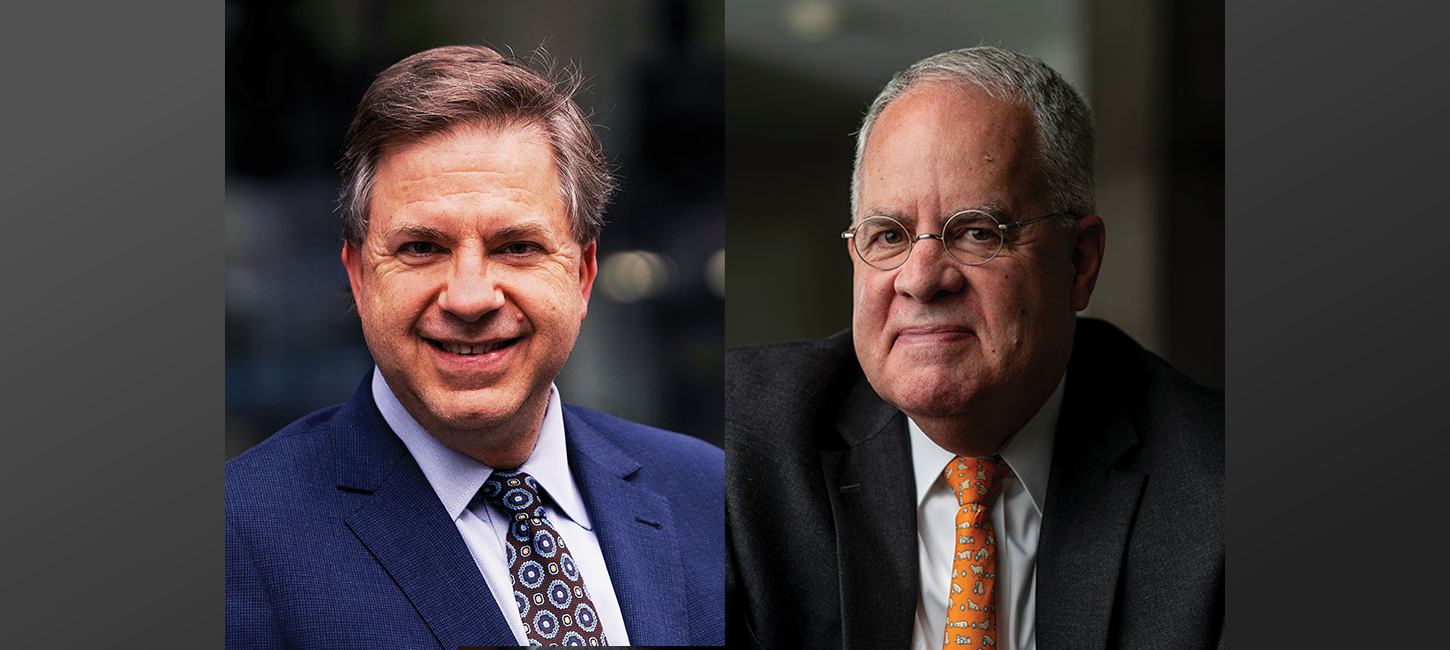It’s an incredibly challenging moment for businesses of all shapes and sizes. As the pandemic lingers, the war between Russia and Ukraine drags on, energy prices spike and supply chain disruptions fester, there’s a need to make tough choices about everything from investments and labor to materials sourcing and where to locate production. Moreover, all of this is taking place amid climate disruption and growing political instability worldwide.
IQ spoke with two preeminent experts about the current state of the world—and how it impacts businesses. Todd C. Chapman has served as United States ambassador to Ecuador and Brazil. He also held numerous positions within the U.S. State Department. He now is an international business consultant and serves on four advisory and corporate boards in Brazil and the U.S. David R. Shedd is a retired Central Intelligence Agency (CIA) officer who most recently served as acting director of the U.S. Defense Intelligence Agency. He is on the board of directors for eight companies.
Together, they offer views on how business leaders can address today’s geopolitical risk and instability—and build stronger and more resilient organizations.
“The global pandemic has upset so many things. Beyond the obvious humanitarian tragedy, it has completely disrupted the world economy. It highlighted how interconnected we have become. I think we all knew this intellectually, but now we’re seeing the fallout.”—Todd Chapman
IQ: How do today’s geopolitical risks stack up with the past? How has it changed?
Todd Chapman: Like other times of great global tension in world history, an aggressive world power, in this case, Russia, has invaded a neighboring country and disrupted the world with the end result still uncertain. Yet unlike earlier periods of conflict, the world is also still recovering from the effects of the COVID pandemic, as well as the disruption of global supply chains. The convergence of these factors is bringing new levels of stress and risk in international relations.
David Shedd: We are faced with a challenge to the international order. It isn’t only what Russia is doing in Ukraine. You have North Korea and Iran feeling empowered, and China challenging for global dominance. We haven’t seen anything like this since World War II. There are increasing complexities in alliances. A silver lining is that there has been much closer unification of countries within NATO.
IQ: What is the ongoing impact of the pandemic and supply chain disruptions?
Mr. Shedd: We’re seeing a level of disruption that most of us have never witnessed before. Some of these problems are unavoidable because companies and countries are so interdependent and interlinked, but others could have been avoided through better planning and preparation.
Mr. Chapman: The global pandemic has upset so many things. Beyond the obvious humanitarian tragedy, it has completely disrupted the world economy. It highlighted how interconnected we have become. I think we all knew this intellectually, but now we’re seeing the fallout. This experience has underscored the importance of understanding the political, social, and health risks that impact global business operations. The economic dislocations resulting from the pandemic also highlighted the importance of sourcing and producing goods in countries in which you can have confidence. Some companies end up overly concentrating their business in problematic countries simply because of pricing advantages without fully assessing the risks of doing so.
Mr. Shedd: China, for example, has been an extraordinarily attractive partner for the last couple of decades. Not only is it a 1.3 billion-person market, but it’s also been a lot less expensive to locate and manage operations there. But now, with growing trade conflicts and the country in almost absolute lockdown due to COVID, it suddenly doesn’t look so cheap. Companies are finding production is constrained and they can’t meet demands for products.
IQ: What are some of the common mistakes business leaders make when dealing with geopolitical risk?
Mr. Chapman: There has been a tendency to make choices based almost solely on economic factors. We recently saw what happened in Russia. Company after company withdrew from the market—some due to their stance and others due to political pressure. One of the things to keep an eye on is how consumers respond to events. Businesses are increasingly under the magnifying glass. Consumers apply economic pressure that companies must respond to and act on.
Mr. Shedd: Some business leaders make choices based almost solely on economic factors, without a full assessment of political risk. Meanwhile, shareholders, consumers, and employees are increasingly evaluating companies using metrics that extend beyond economics. Consider the decision by many companies to abandon operations in Russia at a significant cost. These decisions are not being made at the insistence of governments, but rather in response to the expectations of these multiple constituencies.

BIO: Todd Chapman, Former U.S. Ambassador to Ecuador and Brazil / Todd Chapman is a career diplomat who has served as a U.S. ambassador to Ecuador and Brazil. Prior to that, he held positions at the U.S. embassies in Mozambique and Afghanistan. Chapman resigned as ambassador to Brazil in 2021 and now sits on the boards of various American and Brazilian companies. He also serves in an advisory role for the Center for Strategic and International Studies and Krach Institute for Tech Diplomacy at Purdue, and as a non-resident fellow at the Payne Institute for Public Policy.
IQ: How can businesses defuse this geopolitical risk?
Mr. Chapman: One way is to spread sourcing and operations around the world. It’s a bit ironic because this used to be fairly normal, but many companies have become enamored of—perhaps addicted to—low-cost providers. Latin America, for example, represents an enormous opportunity that will likely extend over the next few decades. Many of these countries are climbing the economic ladder and they are fairly stable and peaceful—even if there are tensions. There are also strong cultural ties. For U.S. companies, there’s also the advantage of having a shorter supply chain. But other countries like Vietnam, the Philippines, and Malaysia also represent opportunities. The C-suite and boards should be focused on obtaining a geographic breakdown of the business in terms of goods and services—and understanding how to simplify supply chains and reduce geopolitical risk.
IQ: How can business leaders deal with political polarization in the U.S. and internationally?
Mr. Chapman: Governments and corporations, both here and abroad, are finding themselves in new areas of conflict. Shareholders, employees, and customers are increasingly asking companies to speak out on political and social issues that many find polemical. Companies are getting caught in the crossfire. A U.S. state governor once told me that “principles unify and policies divide.” I see it increasingly challenging for business leaders to discern when to move from making pronouncements about principles versus addressing specific policy issues, particularly in areas less directly related to their businesses.
IQ: What can businesses do about the growing risk of cybersecurity threats, particularly originating from rogue governments?
Mr. Shedd: Today, there isn’t a board meeting where cyber isn’t a central topic. There has been an enormous investment from the corporate sector in cybersecurity. I think we’re moving in the right direction—although risks continue. But, at the same time, I don’t think we’re seeing the same commitment in regard to cybersecurity threats emanating from North Korea, Iran, and Russia. The bottom line is that despite the progress we need to do more because adversaries are constantly upping their capabilities.

BIO: David Shedd, Former Director, U.S. Defense Intelligence Agency / David Shedd is a retired CIA officer and former acting director of the U.S. Defense Intelligence Agency. After retiring from government work, Shedd joined the Heritage Foundation as a distinguished visiting fellow and served as an adjunct professor at Patrick Henry College. Now he sits on the boards of directors for several companies and nonprofits operating at the intersection of global security, finance, technology and innovation.
IQ: How can business leaders build a framework for good decision-making in today’s environment, particularly with the volume and velocity of information streaming in?
Mr. Chapman: Leaders need structures to help sort through the deluge of information, verify the authenticity and quality of the sources, and distill and summarize the meaningful and valuable insights quickly. You’re only as good as the intelligence framework you develop. Bringing different perspectives to the table is also important when reviewing macro trends. One thing I learned briefing senior people in the U.S. government is to be willing to discuss the difficult things—and sometimes respectfully disagree. One CEO of a large engineering company put it to me this way: “I don’t need another smart engineer. I need a smart non-engineer to provide me with a reality check and to reveal blind spots.”
“Uncertainty translates into business risks. In China, for example, what happens with the Uyghurs and the human rights issues? What happens with tariffs? What happens with manufacturing as the pandemic continues? It’s a good time to reassess things and possibly make changes.”—David Shedd
Mr. Shedd: It’s absolutely critical to think about black swan events. These are the unexpected and even unlikely things that can wreak havoc with a company, a government and the entire world. What happens if oil goes to $200 a barrel? What happens if a war breaks out in the Middle East and oil production is shut off? What happens if we have an even worse pandemic or inflation spirals out of control?
These shouldn’t be things that keep you up at night, but they are worth thinking about and having a framework and plan for dealing with if they occur. For example, we all knew a pandemic was possible five years ago. Health experts had previously warned us about it, and it was definitely on the radar for the intelligence community. But virtually no one was adequately prepared. Today, a board of directors and those involved with business planning cannot operate in business-as-usual mode in a radically and rapidly changing world.
Mr. Chapman: Black swan event planning indeed is so valuable. That is why the U.S. military performs exercises and U.S. embassies conduct disaster drills. You hope you never have to act and that disaster never strikes, but you want to be as prepared as you possibly can be. There is no way to avoid geopolitical risk —they will certainly come—but there are ways to better navigate these challenges and to achieve more favorable outcomes.
This article appeared in the Summer 2022 issue of Insigniam Quarterly with the headline “Ball of Confusion.” To begin receiving IQ, go here.






